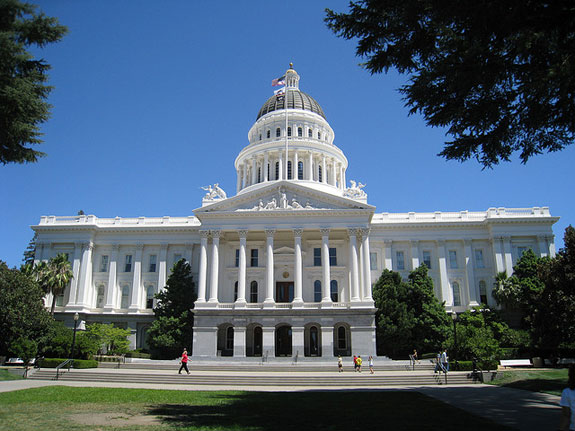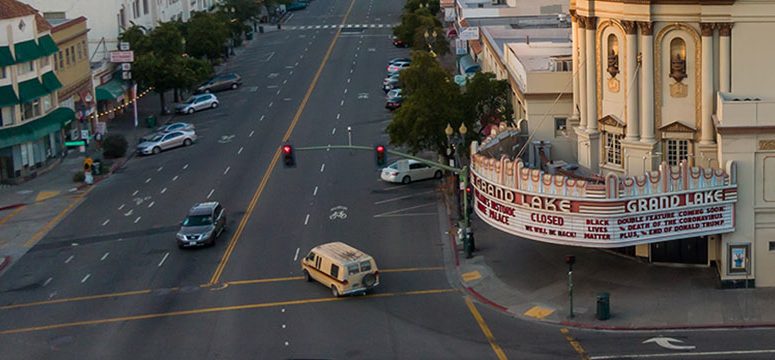The chaos of the closing days of the legislative session is ongoing, which means many bills that are being reported on as being "passed" are not...quite...yet...laws. Some of those the media has reported have "passed" still have to go back to their house of origin, and only a few have been signed by Governor Newsom.
It's worth a quick look at how things stand currently with a number of bills of interest.
The Transportation-Climate Connection
The Complete Streets bill, S.B. 127 from Senator Scott Wiener (D-San Francisco), passed both houses. See here for more about it. Now it's up to the Governor to sign it. Caltrans tried to stop the bill in its last committees, and there's always the chance it is pushing behind the scenes for Newsom to quash it.
Another bill addressing or rather updating existing Caltrans responsibilities got passed, a little more quietly. Assemblymember Laura Friedman (D-Glendale) authored A.B. 285 to get Caltrans to account for updated state greenhouse gas emission goals when it updates the California State Transportation Plan.
It requires the plan to address how those goals will be met, and how the plan supports and is consistent with state air quality standards. It also adds environmental justice as one of the topics it must discuss.
The state transportation plan is a blueprint for the future, but despite the effort that goes into it, it isn't always followed. A.B. 285 would require the Strategic Growth Council to assess how well the plan is being implemented and whether it is helping the transportation sector reduce emissions.
Friedman also authored a bill to redefine "transit stop" to include "major bus stop" under the California Environmental Quality Act. Think: Stops along the Bus Rapid Transit Orange Line in L.A.'s San Fernando Valley. Why does it matter? Certain developments in "transit priority areas" that are near transit stops are now exempt from some CEQA requirements, to encourage denser development to be built near transit. A.B. 1560, which is on the governor's desk, simply acknowledges that Bus Rapid Transit also qualifies as transit that serves large numbers of people.
Meanwhile Newsom has already signed S.B. 400, which adds e-bikes as an option in the Clean Cars 4 All program. That cap-and-trade-funded program offers low-income people financial help replacing polluting cars with cleaner transportation, and now they can choose to buy an e-bike if they wish. According to CalBike, "e-bikes provide a more affordable and cleaner option for local trips, and are more fun and healthy, too.”
The Clean Vehicle Rebate Program, which is not limited to low-income participants, was the subject of A.B. 40, which would have, among other things, raised the amount of incentives for zero-emission vehicles, but that bill was held in committee earlier this year. Another bill from the same author, Assemblymember Phil Ting (D-San Francisco), A.B. 1406, would have made similar adjustments to the program and pushed for higher levels of electric vehicle deployment and more incentives. That bill, according to the SF Chronicle, was killed.
Expect another stab at it next year.
Curtailing Local Resistance to Housing Construction
Senator Nancy Skinner's Housing Crisis Act, S.B. 300, strengthens the Housing Accountability Act by making it harder for local governments to use technicalities to get around its requirements to approve housing. The bill basically calls for local governments to stick to their original zoning ordinances and general plans and not hold endless hearings to delay projects that fit their plans but they don't want to approve. It prohibits locals, via city councils or ballot initiatives, from imposing a moratorium on housing development or changing rules like design standards to stymie housing development.
The bill is headed to the governor, who is likely to sign it.
There are other bills designed to make it easier to build more housing. Among them are two from Assemblymember Miguel Santiago (D-Los Angeles). A.B. 1251 is a gut-and-amend - meaning it was written over the top of an existing bill, so that it could be introduced after the deadline. It aims to incentivize and streamline the development of affordable housing where local governments have not been able to plan to meet state-mandated housing production goals. The bill would allow housing developments with at least forty percent of affordable units to be developed "by right" in areas that are struggling to rezone available land to meet their housing goals.
A.B. 1251 passed quickly through both houses, with no opposition, and is currently on the consent calendar in the Assembly. Once it passes, it would go to the governor for his signature.
Assemblymember Santiago also authored a bill, A.B. 1197, that is specific to L.A. It expands California Environmental Quality Act (CEQA) exemptions for supportive housing and emergency shelters in that city, to help get them approved and built quickly. That bill passed both houses and is waiting for the governor to sign it.
Tenant Protections
A.B. 1482 from Assemblymember David Chiu (D-San Francisco) would cap rent increases and includes a "just cause" eviction provision. The bill is aimed at rent gouging, capping rent increases at five percent plus inflation, but only in older buildings, and only until 2030. From long-term tenants, that could still add up to a lot. Nevertheless it was a hard-fought battle to get the bill through both houses, with the real estate industry arguing that it will make it harder to build much-needed housing in the state.
Newsom has supported the bill and is likely to sign it.
Another winner is Senator Holly Mitchell's bill, S.B. 329, to prohibit landlords from discriminating against potential tenants on the basis of how they are paid. It would eliminate the ability for landlords to refuse a tenant if they pay with a Section 8 voucher, which are allocated to low-income people to help them pay for housing.
S.B. 329 is also headed to the governor.
Another bill aims to close loopholes in the Ellis act - which allows landlords to evict tenants under certain circumstances. A.B. 1399 makes it a little harder for landlords to evict tenants just to raise the rent by disallowing a payment in lieu of offering tenants replacement housing or the option to move back into units from which they were evicted, and by prohibiting piecemeal evictions that skirt Ellis Act rules.
That bill was authored by Assemblymember Richard Bloom (D-Santa Monica). It was also passed along for Newsom's signature.






